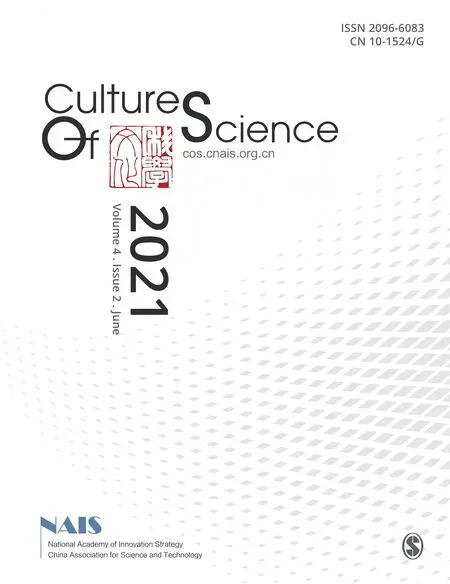Introduction:Science popularization ethics in China
Fujun Ren
National Academy of Innovation Strategy,China
The development of science popularization in China has reached a new historical stage.The growing number of science popularization workers and their enhanced awareness of norms have resulted in a significant step forward for science popularization.Science popularization workers are thinking about how to promote the high-quality and rapid development of science popularization and further the historical mission and social responsibilities of science popularization.As an indispensable part of the national science and technology ethics system,science popularization ethics should be an integral part of science popularization work,and research on the theories and practices of science popularization ethics has become more relevant now than ever before.
In this special issue,we have four theoretical articles that explore theories and practices related to improving the quality of science popularization and achieving effective and responsible science popularization in China.
‘On the concept and connotation of science popularization ethics’ analyses the differences between science popularization ethics and similar concepts,such as science and technology ethics,communication ethics and education ethics and offers insights into the connotations of science popularization ethics in the context of contemporary China.
‘Science popularization and its ethical standpoint’ again considers the connotations of science popularization;it also analyses the standpoint that should be established in work related to science popularization ethics and provides suggestions for practising responsible science popularization.
‘Issues concerning the science communication ethics of science and technology museums’ discusses the characteristics and history of the science and technology museum industry,and,through an analysis of the controversies and uncertainties in science and other components of contemporary science and technology,stresses the complexity of science popularization ethics in those museums.
‘Public understanding of and participation in ethical events relating to science and technology:Comparing China with other countries’ compares the differences in public perceptions and attitudes towards the ethical events of science and technology in China and abroad and puts forward suggestions for strengthening science and technology ethics education and otherwise raising awareness of such ethics.
Through this special issue,we hope to focus the attention of colleagues involved in science popularization theories and practices on the issue of science popularization ethics,inspire further and more robust studies on this topic,encourage science popularization workers to carry out responsible science popularization and support the high-quality development of science popularization in China.
Declaration of conflicting interests
The author declared no potential conflicts of interest with respect to the research,authorship,and/or publication of this article.
Funding
The author received no financial support for the research,authorship,and/or publication of this article.
Author biography
Fujun Ren is a professor,a PhD supervisor and an expert enjoying the State Council Special Allowance.He is the general director of the National Academy of Innovation Strategy and the chief editor ofModern ScienceandCultures of Science.He holds a PhD from the Harbin Institute of Technology and was a postdoctoral fellow of Tsinghua University.He previously served as the director of the China Research Institute for Science Popularization;the vice president of the China Science Writers Association and of the Beijing Association for Science and Technology and the chief editor ofStudies on Science Popularization.His areas of expertise include science popularization,innovative culture,scientific culture and scientific policy.

